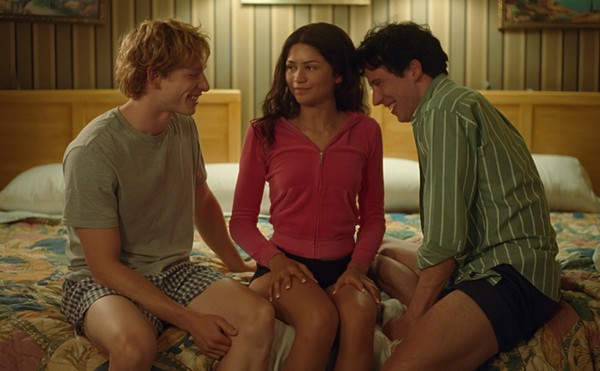June 14
2 p.m.: Jew-Boy Levi (Didi Danquart, Germany, 1999, 94 min.). Set in a small town in the Black Forest in 1935, Jew-Boy Levi, based on a play by Thomas Strittmatter, finds a new, understated way to re-create the often-told story of Nazi Germany. There are none of the usual scenes of riots, rallies or breaking glass in this bucolic tragicomedy, but the gradual triumph of wickedness is subtle and chilling. The Nazi influence comes in the form of railway engineers from Berlin who slowly and almost unconsciously use violence and terror to bring the once-peaceful village under their control. No heavy-handed thugs or ideologues, these villains are casually amoral and tipsy with power. They're led, fittingly, by an amateur magician whose greatest trick is to turn the entire community -- middle class, poor, right, left -- against each other, leaving the title character, a gentle lovestruck cattle dealer, stuck helplessly in the middle. Well acted and beautifully photographed, Jew-Boy Levi looks at the moral damage wreaked by fascism from a surprisingly fresh perspective. In German with English subtitles. (RH)
5:30 p.m.: Women. (Rami Na'aman, Israel, 1994, 95 min.). This film opens with a happy event -- a marriage -- but it's pretty much downhill from there. In a Sephardic community in turn-of-the-century Jerusalem, lovely Rachel marries the pious and respected rabbi. But 14 years later, they're still without children, and Rachel is oppressed. Her husband is patient and pious -- "Did Abraham leave Sarah?" -- but Rachel takes matters into her own hands, insisting that her husband take another, younger wife. Brilliant, huh? And that's the problem with this film: We can see it all coming. Even though we sympathize with Rachel's pain, it's hard to stand behind her when she concocts this terribly misconstrued plan. So where does that leave us? With her blaming mother-in-law? ("Satan knocked on the door, and we welcomed him in.") Some of the shots are lovely, but the movie is generally maudlin and monotonous -- literally, the same flute motif is repeated in nearly every scene. In Hebrew with English subtitles. (ML)
8 p.m.: There Once Was a Town (Jeff Bieber, U.S., 1999, 85 min.). Shot in a conventional talking-heads-and-home-movies documentary style, There Once Was a Town follows a group of Holocaust survivors and their family members to Eishyshok, a Polish shtetl whose thousands of Jewish citizens were massacred during World War II. The offscreen narration (by Ed Asner, whose own family came from Eishyshok) is more than a little heavy-handed at times and the archival footage isn't always clearly identified, but the film's history lesson stands on its own. Not surprisingly, the most touching moments come from the survivors and their memories, as when a now-elderly man doggedly locates the woman who, at the age of 6, brought him food every day while he hid in her family's barn. As he embraces the now-stocky and middle-aged peasant woman, you can almost see the frightened teenager and confused child of a half-century ago, so strong are the memories evoked. In Polish and English with English subtitles. Postfilm discussion with director Bieber and Dr. Judith Doneson. (RH)
June 15
2 p.m.: "god@heaven" (Joseph Neulight, U.S., 1998, 20 min.) and "The Fifth Commandment: Honor Thy Father and Thy Mother" (Simon Azulay, Israel, 1998, 45 min.). It's hard to know precisely what to make of the little short "god@heaven," in which a young boy e-mails God (at Heaven.net and not Heaven.com -- God forbid that God should make a profit from this) and gets an answer. The shots are lovely, the spirits high, but I think the film may actually be suggesting that the boy's dog is God (?). The film is also oddly silent because so much occurs over e-mail, and the boy seems eerily isolated. The unintentional message -- about what computers are doing to us -- may be more powerful than the intended one (whatever that is). In the heartbreaking documentary "The Fifth Commandment," a Moroccan Israeli family struggles with a big change: One of their sons has become a devout Jew. As the Baal Tshuvah movement grows, it's a struggle that many Jewish families are facing, and the film makes clear that what may seem a blessing in some cultures is deeply challenging for nonobservant Jews. The parents, retired, get their greatest (and seemingly only) pleasure from bringing the family together for holiday meals. But the children are grown and leading their own lives, so it's a pleasure that's harder and harder to come by. When their son Ofer becomes Hasidic, he removes himself from the family to study and live among other Hasids, becoming the thorn in his family's side -- the one who's missing at all the meals. To make matters worse, Ofer is critical of his parents and demands that they adhere strictly to the Jewish laws when he visits -- quite a chore. The parents want the family together; Ofer wants to follow his spiritual path. Oy, I tell you. It's a heartbreaker. In Hebrew with English subtitles. Postfilm discussion with Rabbi Jeffrey Bienenfeld. (ML)
5:30 p.m.: Man Is Woman (Jean-Jacques Zilberman, France, 1997, 96 min.). Yet another example of the untranslatability of French -- the language and the sensibility. There's something slightly off here, though other than the title, it's hard to say exactly what. Simon, a gay Jewish French guy (with all of those signifiers, he should definitely dress better than he does), is in love with his best friend, who's straight and married to a woman. Meanwhile, Simon's uncle promises him 10 million francs if he marries a woman. Simon's out and proud, and not interested in money, but when his uncle cuts off his bank account and locks him out of his apartment, it's only natural that Simon spend the night with Rosalie, a lovely, pious American Jew who sings Yiddish opera. They fall in love (sort of) and get married, and yup -- it's downhill from there. Problem: There are many opportunities for Simon to back out, and he never does, so we watch him careen toward disaster for most of the film. It's uncomfortable, especially because the film seems to view itself as a comedy. Oh, those crazy French! In French with English subtitles. (ML)
8 p.m.: All My Loved Ones (Matej Minác, Czeck Republic/Slovakia/Poland, 1999, 90 min.) This gentle, discursive drama nostalgically recalls a large Czech Jewish clan on the cusp of Germany's invasion. Portents of war periodically intrude -- newsreels of Hitler and goose-stepping troops unspool in the local cinema, a seemingly benign German gardener bellows Nazi anthems with scary exuberance -- but the Silbersteins cling to the mistaken belief that trouble will stop short of their door. The story is told to a large degree from the perspective of David, the youngest family member, who is at last packed off to English safety when his parents belatedly acknowledge the dire precariousness of their situation. All My Loved Ones thus essentially memorializes David's lost relatives, but the film derives its emotional power not by showing their extermination -- it stops before the overt violence begins -- but by recording the small, telling details of their prewar lives: The mundane is made glorious and unbearably poignant by our knowledge of the imminent horror. The movie also pays moving tribute to the real-life savior of children such as David: Nicholas Winton (Rupert Graves), an Englishman who spirited 669 young Czech Jews out of the country before World War II's outbreak. (The actual Winton is seen in documentary footage that opens and closes the film.) In Czech, Polish, German and English with English subtitles. Postfilm discussion with director Minác. (CF)





